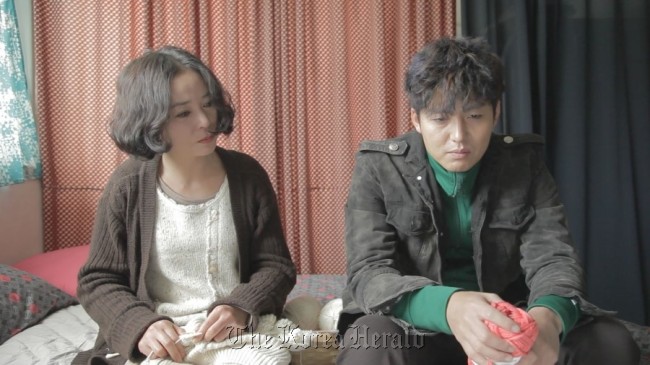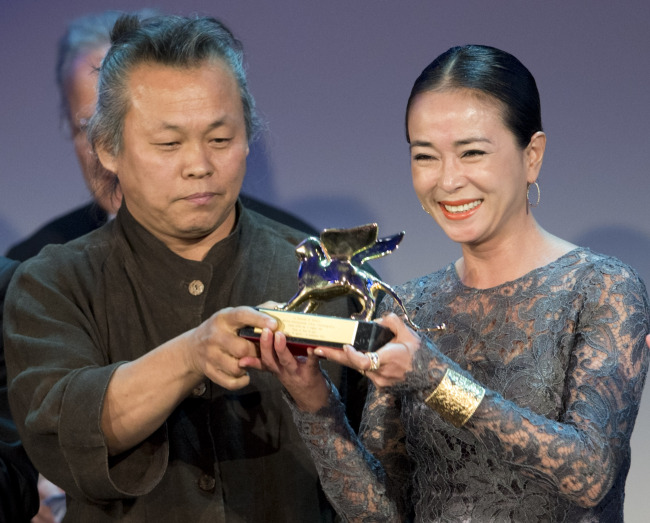Venice festival winner a hard-hitting morality tale
By Korea HeraldPublished : Sept. 9, 2012 - 19:29

Kim’s latest film bags the top prize, ‘The Master’ by Paul Thomas Anderson gets Silver Lion award
VENICE, Italy (AFP) ― South Korean director Kim Ki-duk’s “Pieta” won the top prize at the Venice film festival, while Paul Thomas Anderson’s Scientology-inspired “The Master” walked off with two major awards.
The eccentric Kim delighted the audience at the awards ceremony by breaking into song on stage to celebrate winning the Golden Lion award for his bleak morality tale.
The director, whose personality seems far from the darkness of his protagonists, belted out the Korean folk song “Arirang” on stage to thank the jury.
His film tells the story of a diabolical loan shark who prowls the alleys and clapped-out workshops of a Seoul district being redeveloped.
A mysterious woman claiming to be his mother walks into his life and the twisted hero struggles for redemption in an emotional crescendo.
Kim said that his film was intended to be a denunciation of “extreme capitalism,” adding that money was the “third protagonist” in the movie.
The loan shark in the film is played with skin-crawling intensity by Lee Jung-jin and the woman is a haunting presence played by Cho Min-soo.
The film’s title was inspired by Michelangelo’s famous “Pieta” statue in the Vatican of the Virgin Mary holding the corpse of her son Jesus Christ.
“I’ve been to the Vatican twice to admire this masterpiece by Michelangelo. The image of this embrace has stayed with me for many years. For me, it is an embrace of humanity,” the pony-tailed director told reporters earlier.
Actor Lee spoke of his apprehension when taking the part of the loan shark.
“I was a bit afraid because he works with darkness, with difficulty, but it all went very well,” Lee said.
“I was not asked to play beautiful scenes but to play true scenes.”
VENICE, Italy (AFP) ― South Korean director Kim Ki-duk’s “Pieta” won the top prize at the Venice film festival, while Paul Thomas Anderson’s Scientology-inspired “The Master” walked off with two major awards.
The eccentric Kim delighted the audience at the awards ceremony by breaking into song on stage to celebrate winning the Golden Lion award for his bleak morality tale.
The director, whose personality seems far from the darkness of his protagonists, belted out the Korean folk song “Arirang” on stage to thank the jury.
His film tells the story of a diabolical loan shark who prowls the alleys and clapped-out workshops of a Seoul district being redeveloped.
A mysterious woman claiming to be his mother walks into his life and the twisted hero struggles for redemption in an emotional crescendo.
Kim said that his film was intended to be a denunciation of “extreme capitalism,” adding that money was the “third protagonist” in the movie.
The loan shark in the film is played with skin-crawling intensity by Lee Jung-jin and the woman is a haunting presence played by Cho Min-soo.
The film’s title was inspired by Michelangelo’s famous “Pieta” statue in the Vatican of the Virgin Mary holding the corpse of her son Jesus Christ.
“I’ve been to the Vatican twice to admire this masterpiece by Michelangelo. The image of this embrace has stayed with me for many years. For me, it is an embrace of humanity,” the pony-tailed director told reporters earlier.
Actor Lee spoke of his apprehension when taking the part of the loan shark.
“I was a bit afraid because he works with darkness, with difficulty, but it all went very well,” Lee said.
“I was not asked to play beautiful scenes but to play true scenes.”

The 51-year-old Kim is no stranger to the Venice film festival.
He won the best director award in 2004 for his “Bin-jip” (“3-Iron”) about the relationship between a young drifter and an abused housewife.
Hollywood producer and director Michael Mann, who presided over this year’s jury, paid tribute to all 18 films in competition.
But “Pieta” in particular “seduced you viscerally,” he added.
The best actor prize went jointly to Joaquin Phoenix and Philip Seymour Hoffman for their performances in Anderson’s “The Master.”
And Anderson picked up the Silver Lion award for best director.
Phoenix plays an alcoholic World War II veteran who becomes a disciple to the charismatic Hoffman, playing the leader of a nascent movement called “The Cause” in the beautifully shot movie set in the 1950s.
Hoffman’s character is loosely based on Scientology founder L. Ron Hubbard.
As Phoenix and Anderson were not present, the prizes were collected by a dishevelled-looking Hoffman, who said he had just stepped off a plane.
“Joaquin Phoenix is a life force in the film and I kind of rode it in the film and that was my performance. It was something untameable,” Hoffman said.
Receiving the award for Anderson, he said: “He happens to be one of the great filmmakers in the world. I think he’s the best.”
The award for best actress was picked up by Hadas Yaron who plays a fragile but passionate young girl becoming a woman in an Orthodox Hasidic community in Tel Aviv in Rama Burshtein’s “Lemale Et Ha’ Chalal” (“Fill the Void”).
The jury also awarded a special prize to Austrian director Ulrich Seidl’s “PARADIES: Glaube” (“PARADISE: Faith”) ― a controversial film about a disturbed woman whose Catholic faith turns into a sexual obsession.
French director Olivier Assayas won best screenplay for his “Apres Mai” (“Something in the Air”) about a group of politically active youngsters growing up in France in the early 1970s.
The prize for the best rising star went to Fabrizio Falco for performances in two Italian films: Marco Bellocchio’s “Bella Addormentata” and in Daniele Cipri’s “E Stato Il Figlio.”
Cipri picked up the award for best technical contribution for the cinematography in his film.
The world’s oldest film festival has brought Hollywood veterans like Robert Redford and new stars Selena Gomez and Vanessa Hudgens as well as art house auteurs from around the globe to the seaside resort of the Venice Lido.
The eagerly awaited “To the Wonder” by Terrence Malick starring Ben Affleck and Javier Bardem disappointed many critics with its overtly auteurish visual story of love in its many forms.
The festival included several new talents from an Arab world in upheaval and a strong focus on the social and moral fallout from the economic crisis sweeping Europe and the United States.
Chronology of Korea’s award winning films at major festivals
Feb.1961: “Coachman” by Kang Dae-jin wins the Silver Bear Extraordinary prize at the Berlin Film Festival.
Sept. 1987: Kang Soo-yeon in “The Surrogate Woman” by Im Kwon-taek wins the best actress award at the Venice Film Festival.
Feb. 1994: “Passage to Buddha” by Jang Sun-woo wins the Alfred Bauer Prize at the Berlin Film Festival.
May 2002: “Strokes of Fire” by Im Kwon-taek wins the Best Director award at the Cannes Film Festival.
Sept. 2002: “Oasis” by Lee Chang-don wins the Silver Lion award at the Venice Film Festival.
Feb. 2004: “Samaria” by Kim Ki-duk wins the Silver Bear prize at the Berlin Film Festival.
May 2004: “Oldboy” by Park Chan-wook wins the Grand Prize Jury Award at the Cannes Film Festival.
Sept. 2004: “3-Iron” by Kim Ki-duk wins the Silver Lion as Best Director at the competition sector of the Venice Film Festival.
May 2007: Jeon Do-yeon in “Secret Sunshine” by Lee Chang-dong wins the best actress prize at the Cannes Film Festival.
Sept. 2007: “With a Girl of Black Soil” by Jeon Soo-il wins C.I.C.A.E Award and Lina Mangiacapre Award at the Venice Film Festival.
May 2009: “Thirst” by Park Chan-wook wins the Jury Prize at the Cannes Film Festival.
May 2010: “Poetry” by Lee Chang-dong wins the best screenplay prize at the Cannes Film Festival.
May 2010: “Ha Ha Ha” by Hong Sang-soo wins the top prize for the “Un Certain Regard” category at the Cannes Film Festival.
May 2011: “Arirang” by Kim Ki-duk wins the top prize for the “Un Certain Regard” category at the Cannes Film Festival.
Feb. 2011: “Night Fishing” by Park Chan-wook and Park Chan-kyong wins the Golden Bear Award for best short film at the Berlin Film Festival.
May 2012: “Circle Line” by Shin Su-won wins the CANAL+ Prize at the Cannes Film Festival.
Sept. 2012: “Pieta” by Kim Ki-duk wins the Golden Lion award at the 69th Venice Film Festival.
(Yonhap News)
-
Articles by Korea Herald







![[Graphic News] More Koreans say they plan long-distance trips this year](http://res.heraldm.com/phpwas/restmb_idxmake.php?idx=644&simg=/content/image/2024/04/17/20240417050828_0.gif&u=)
![[KH Explains] Hyundai's full hybrid edge to pay off amid slow transition to pure EVs](http://res.heraldm.com/phpwas/restmb_idxmake.php?idx=644&simg=/content/image/2024/04/18/20240418050645_0.jpg&u=20240419100350)








![[KH Explains] Hyundai's full hybrid edge to pay off amid slow transition to pure EVs](http://res.heraldm.com/phpwas/restmb_idxmake.php?idx=652&simg=/content/image/2024/04/18/20240418050645_0.jpg&u=20240419100350)

![[Today’s K-pop] Illit drops debut single remix](http://res.heraldm.com/phpwas/restmb_idxmake.php?idx=642&simg=/content/image/2024/04/19/20240419050612_0.jpg&u=)